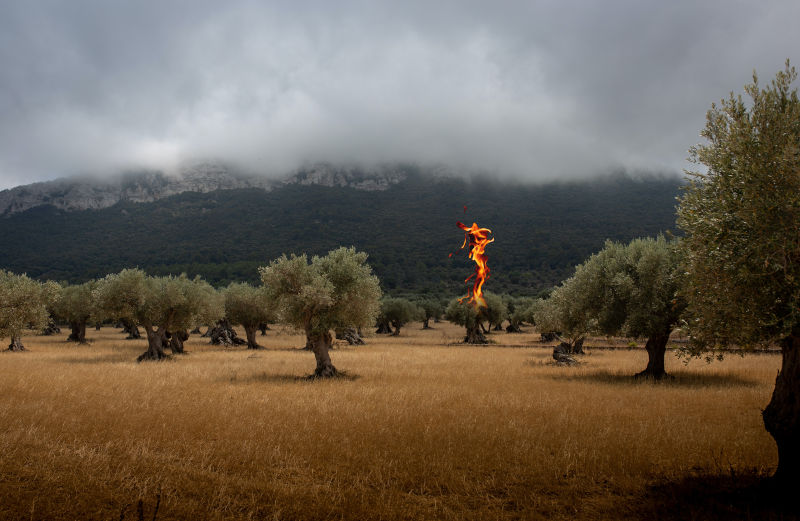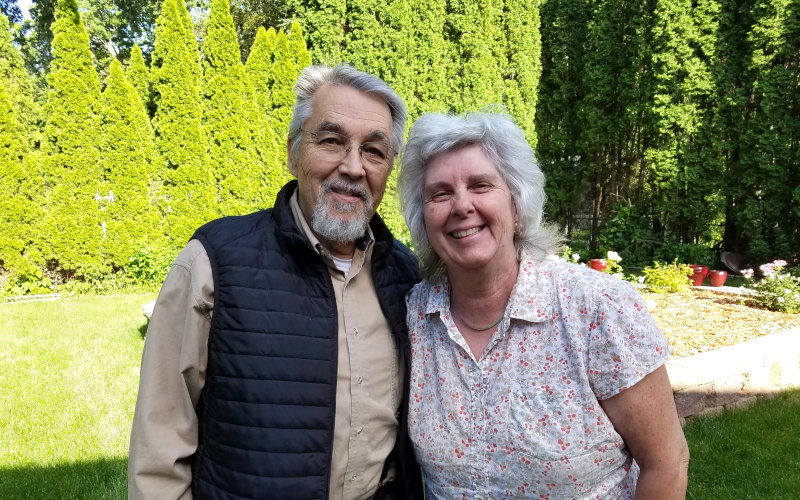The Burning Bush Believer

“And the angel of the LORD appeared unto him in a flame of fire out of the midst of a bush” (Exodus 3:2).
The business of on-the-spot, spur-of-the-moment testifying / witnessing / soulwinning is never to be forsaken. God has commanded each of us to turn aside and seek the sinner. Life is full of situations where one has no opportunity to do anything more than offer a tract, speak the gospel, ask for repentance and faith, pray and go on. Furthermore, God has commanded each of us to turn aside and seek the struggling saint, the fallen saint, the hurting saint. Life is full of circumstances where one has no opportunity to do anything more than hear of a need, offer a word of guidance, pray for comfort, and go on. Take every opportunity to testify. Take every opportunity to witness. Take every opportunity to win souls. Take every one of these opportunities to help strangers who have been ditched and left half-dead by the religions and rebels of the world. God gives such fruit, and it remains, and God receives glory.
This message, however, concerns a different aspect of testifying, witnessing / soulwinning. It concerns the work of the saints in their familiar settings, in their spheres of influence where they have day-to-day, year-by-year influence. Christ cited the burning bush in his unassailable answer to the Sadducees regarding the resurrection, and Stephen mentioned the burning bush in his monumental message to the Libertines before the high priest. This portion of Exodus presents a bush that communicates valuable lessons for any child of God.
The Burning Bush Believer is Not Consumed in God’s Fire
“…and, behold, the bush burned with fire, and the bush was not consumed” (Exodus 3:2). In the Upper Room Discourse on the last night of his earthly life, Jesus Christ gave his apostles a reality check for the remainder of their earthly sojourns. He told them that they would be hated by the world, and that they would suffer tribulation in this world (John 15:19; 16:33). Upon their return to Lystra (where Paul was stoned) and Iconium, both Paul and Barnabas exhorted the new believers to remain steadfast in their faith even though they would not ultimately enter the kingdom of God without the suffering of difficult tribulations (Acts 14:22). At the end of his earthly ministry, Peter wrote an entire epistle in which he detailed the fiery trials of believers (I Peter 1:7; 4:12) and gave Scriptural and spiritual instruction as to a godly response.
These fires from God−persecution, purging, and proving−are designed to burn off the dross and leave a cleaner vessel (Proverbs 25:4). Our loving and all-wise Father does not intend to burn his believers to ashes, but he does burn from off their surfaces the rust and corrosion of contact with this world and the grime of corruption of this flesh. Peter and Paul both indicate that such fires are the means by which the children of God enter the fellowship of Christ’s sufferings (Philippians 3:10; I Peter 4:13). This is never co-redemptive in nature. It is, rather, productive of deeper communion with our Saviour than many wish to pursue.
Burning bush believers are those who endure the fires of testing as did the three Hebrew children by walking with Christ through those fires. They come forth as gold from the fires of testing as Job did, by believing in God’s goodness and purpose even in the most calamitous and confusing time of his life. They emerge from the fires of testing like Naomi did, recognizing God’s purging and taking personal responsibility rather than blaming God. They rise up from the fires of God’s testing like Hannah did, singing a psalm of praise five times longer than the prayer she prayed in the previous chapter.
Burning bush believers fall seven times and rise again. They find the delicate balance between having continual sorrow in their hearts and rejoicing in the Lord. They experience what looks like failure and walk in victory. They believe God when their version of Job’s friends condemn them for their five percent fault when they clearly have ninety-five percent righteousness. Like Elijah, they stand in the cave mouth and listen for the still, small voice; then they go back to work for their worthy Saviour. Like Jeremiah, they are lifted up from the murky dungeon by some unsung Ethiopian eunuch, and they still preach the truth that put them into the dungeon in the first place. Like Aquila and Priscilla, they lay down their own necks, and as soon as they are free of the guillotine, they help the preachers and the churches again.
Perhaps this coronavirus scourge will steel the souls of the church again so that believers are less prone to complaint for little inconveniences and more ready for praise for little blessings! May the Holy Spirit fill his people once again and revive his church once again so that we count it joy when we encounter God’s fires, so that we rejoice when we are counted worthy to suffer shame for his name, so that we commit the keeping of our souls to Christ because he is a faithful Creator and Saviour.
May our Lord Jesus Christ so live through his children once again that they have a Romans 5:3-5 testimony whereby their tribulations produce patience that develops into the experience that God comes through every time. May that continue such that the experiences of God’s coming through bring hope that he will come through again. May we be that generation of saints who are not ashamed of the testimony of our Lord nor of his saints in difficulty. May we be that priesthood of believers who are partakers of the afflictions of the gospel. May we be that holy nation of God’s children who will show forth his praises and suffer all things to bring others to Jesus. In this manner will we show the love of God shed abroad in our hearts.
The Burning Bush Believer is a Spectacle that Others Will Turn Aside to See
“And Moses said, I will now turn aside, and see this great sight, why the bush is not burnt” (Exodus 3:3). Believers are to be visible to the world. Listen to Jesus tell his disciples, “A city that is set on a hill cannot be hid” (Matthew 5:14). Listen again as Paul exhorts the Philippians to be “blameless and harmless, the sons of God, without rebuke, in the midst of a crooked and perverse nation, among whom ye shine as lights in the world” (Philippians 2:15). Listen a third time as Peter admonished scattered strangers to have an honest conversation in the world so that those slandering them might by their “good works, which they shall behold, glorify God in the day of visitation” (I Peter 2:12).
This visibility was never to be the self-glorifying, instant-reward almsgiving and praying and fasting of the Pharisees. This visibility was ever and always to be the God-glorifying, eventual-reward work of the child of God.
God’s children ought to be so visible as representations of Christ in their culture that the world notices them as Moses noticed the bush. They ought to be so visible as the ambassadors of Christ in their generation that the world stops in its tracks and turns aside to see them as Moses turned aside to see this bush.
This visibility ought to be in the believer’s countenance, a face that communicates the love of God for sinners and saints, a face that communicates the fruit of the Spirit, a face that communicates the meekness and gentleness of Christ. No, this is not a plastic smile that always likes and shares and never disapproves and frowns. No, this is not a rubber-stamp grin that always settles for whatever makes others comfortable and never confronts with a furrowed brow. However, it is a visible countenance that says, “Jesus Christ lives here.” It is a visible countenance that accepts the contrite, the castaway, and the crushed. It is a visible countenance that welcomes the humble and receives the penitent and comforts the grieving.
This visibility ought to be in the believer’s conversation, a conversation that communicates truth when the world is wandering in error, that communicates forgiveness when the world is shriveling in bitterness, that communicates courage when the world is cowering in fear, that communicates purity when the world is suffocating in filth, that communicates hope when the world is drowning in despair, that communicates peace when the world is dying in conflict.
This visibility ought to be in the believer’s conduct, a conduct that is polite when others are crass, honorable when others are rude, disciplined when others are apathetic, righteous when others are wicked, clean when others are dirty, sweet when others are sour, kind when others are cruel and abusive, forgiving when others are bitter and malicious, grateful when others are discontented and dissatisfied.
This visibility ought to be in the believer’s clothing, an attire that is gender-distinct in a world that has removed all the ancient landmarks of gender distinction. This clothing should be clearly masculine for men and boys and clearly feminine for women and girls. (Our world has not benefitted from the departure of gentlemen and ladies from our society.) Again, this clothing must be modest by the definition in Scripture. Whether men or women, their clothing should be loose enough to conceal from sight all that would be sensually attractive. Whether men or women, their clothing should be long enough to cover all that Scripture indicates should be covered. Whether men or women, their clothing should be lowly enough to prevent the undue attraction brought on by outlandish fads and extremism. Also, this clothing should be appropriate as in church attire for church and picnic attire for a picnic and leaf-raking attire for leaf-raking.
The unsaved and the weak among the saved will turn aside and see burning bush believers who are not consumed in the fires of testing. The unsaved and the weak among the saved will turn aside and see the burning bush believers whose countenance, conversation, conduct, and clothing are noticeable and unique. The bush in the desert attracted Moses attention because it did not burn in the fire, because that bush was noticeably different. He noticed, changed direction, and approached.
The Burning Bush Believer Becomes a Source of God’s Voice
The bush itself did not speak, but God spoke out of that bush: “God called to him out of the midst of the bush.” God had a message for Moses, and he spoke it out of the center of a bush. While some of our modern culture has neither interest in nor inclination toward God’s voice or message, there are still some Ethiopian eunuchs and Sergius Pauluses who desire the truth. They are actually seeking for answers to their questions, solutions to their problems, and peace for their turmoil. They travel through society, noticing the conformity until it is blurred out of consciousness. Then suddenly, they observe a bush that is not burned in the fires of God’s testing, and they turn aside to see it.
That burning bush believer is not inspired as were the Bible writers, but he is a source of God’s voice. If the one turning aside to see is lost, that burning bush believer has the gospel message. God’s voice to that needy sinner is that he is a hopelessly condemned sinner who must confess his sins, repent, and believe that Christ paid all the price of sin with his blood. That gospel message is made ten times more relevant and meaningful when the sinner in question has observed that the gospel messenger has not been consumed in the fires of life and has not conformed to the cultural blah of the day. That burning bush believer has the “upper hand” as it were, because his life not only speaks a message but shows it.
That burning bush believer is also a source of God’s voice if the one turning aside to see is saved but needing discipleship, help, wisdom, comfort, or any other of a long list of needs for growth. God’s voice from that burning bush believer is a principle of life for discipleship, a correction in habit for help, a proverb of truth for wisdom, a promise of God for comfort, etc. That biblical message is made ten times more relevant and meaningful when that seeking saint in question has observed that burning bush believer, and has seen that he has not been consumed in the fires God has allowed and has not conformed to the norm the world has embraced.
God’s children are to be heard. Their voices are to be publishing, proclaiming voices. John the Baptist was a voice in the wilderness. Isaiah the prophet was a trumpet voice lifted up to communicate to his generation. Nahum spoke of those using their voices to publish peace upon the mountains. Paul spoke of the necessity of preaching, adding that there was a woe upon him if he did not preach.
When God spoke out of this bush, he gave a message to Moses. Believers ought to speak for God. As soldiers, God’s children should use their voices to fight for their King and his kingdom. As servants, God’s children should use their voices to submit to their Lord and his church. As sons, God’s children should use their voices to honor their Father and his family.
The Burning Bush Believer Sends Listeners Into God’s Will
Doubtless, many hear but do not listen. Moses heard, and even though a lengthy conversation with interspersed objections ensued, Moses listened and obeyed. God was credible to Moses because the bush did not burn. God was powerful to Moses because the message matched what he saw. The message of the gospel to unsaved people and the message of truth to saved people will be credible when its messenger makes God both visible and audible.
This message began with a paragraph requiring the saints to witness for Christ and speak of him at every opportunity. This message began with a paragraph stating the need for saints to open their mouths and talk, even in the unplanned encounters that last only moments.
Just as spontaneous testimony is part of the believer’s life, so is the business of burning bush testifying / witnessing / soulwinning. Life is replete with situations of prolonged contact with those in one’s sphere of influence, and it is those who will notice the bush that is not burned. When someone preaches Christ but does not show him, people cannot see Christ. When someone lives for Jesus but does not speak for him, people cannot hear Christ. Either way, they go on to earthly, and sometimes eternal, consequence without the truth.
May this editor urge upon you, Dear Reader, the responsibility each of us has to be a burning bush believer. Somebody out there will turn aside to see.
Editor’s Note: This article was originally published in the bi-monthly sermon paper the Trumpet of Truth. Used by permission.
Comments
Dear pastor, God gave the opportunity
to reading your article. It has been a great blessing in my life. I am from India my father is a pastor, please pray and support our ministries.





